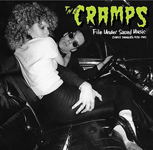|
|
 |
Dusted Reviews
Artist: The Cramps Album: File Under Sacred Music: Early Singles 1978-1981 Label: Munster Review date: Feb. 23, 2012 |

|
|
|
 |
“You ain’t no punk, you punk / You wanna talk about the reeeeeal junk?”
That pretty much sums it up. With that single line taken from their 1980 single “Garbageman,” The Cramps threw down a gauntlet to all would-be music street toughs and declared themselves the kings (and queens) of the trash heap. The concept of marrying vintage rockabilly, garage, and good ol’ American sleaze with punk snarl, though almost mundane in the context of today’s garage-rock underground, was a revelatory notion when it was first dropped on a nascent “new wave” scene some 30-plus years ago.
The story goes something like this: Erick Purkhiser and Kristy Wallace met in California in the early 1970s and fell in love over a shared passion for trash culture. They changed their names to Lux Interior and Poison Ivy Rorschach, respectively, formed The Cramps, and hit the road. After a brief, formative layover in Akron, Ohio, the band made its way to New York City. Though certainly eccentric enough to blend in with the weirdoes throwing down in Ohio and New York at the time, The Cramps’ near religious devotion to the raw, untamed noise of rock’s early days set them askew of a musical movement the philosophy of which had as much to do with destroying the past as it did any single cohesive musical aesthetic. While The Ramones had an undeniable affection for bubblegum hooks and horror movie schlock, they laid into it with a buzz saw. The Cramps on the other hand were like mad scientists hell bent on creating a more potent strain of an already deadly germ. They handled the various samples with care, paying excessive attention to detail, and unleashed the twisted byproduct of their tinkering with pride and an arched eyebrow.
File Under Sacred Music 1978-1981 collects the earliest official examples of the band’s experiments and is available as a single-disc CD or 7” box set. At 22 songs, comprising The Cramp’s first ten singles, it also represents arguably the peak of their musical output. Divided roughly equally between covers and originals (with many of the originals being brazen homages to early tunes), the band’s singles simply wallow in the reverb-soaked twang of the Sun Records era. Yet to think of The Cramps as simple mimics is to miss the point. One can certainly question whether a cover of Ricky Nelson’s "Lonely Town" is really necessary. And it’s debatable who’s more unhinged when raving about doing the "hammer-lock" on the fabulous "The Crusher" (a tribute to pro-wrestler Reggie "The Crusher" Linkowski), Interior or Bob Nolan of The Novas (who performed the novelty original). But there’s no denying The Cramps took, say, "Surfin’ Bird" to a stranger place than The Trashmen, The Rivingtons, or even The Ramones ever intended, extending the song into an apoplectic nightmare of screaming guitar chaos and psychotic burbles. And regardless of how prominently Lux and Ivy’s influence were displayed on their sleeves, no one could predict originals such as "T.V. Set," "Twist & Shout," or "Human Fly." They’re simply skuzzier, nosier and more flippant than what inspired them. As dangerous as Gene Vincent may have been, he never threatened to cut off someone’s head and use the eyeballs for dials on a T.V. set.
That might be bordering on sacrilege, but the lasting power of The Cramps doesn’t rest merely on the crate-digging they did to keep pop’s trashy underbelly exposed. Simply put, they took the music they loved and they made it their own. As the title of this set makes clear, this was indeed "sacred music" to Lux and Ivy, and there’s a serious sense of hero worship going on here. And while The Cramps did devolve into their own form of self-parody as the years wore on and are inadvertently responsible for the unfortunate "psychobilly" movement, their early days, represented by these 22 tracks, were all about inspiration and individuality. Lux and Ivy saw themselves in the reflection of a newly waxed Big Boat Cadillac and they ran with it; they aligned themselves with the juvenile delinquents of a bygone era and embraced the inherent danger in records that might seem quaint now, but were once burned and crushed by concerned citizens. In the end, they established a musical and aesthetic template for all outcasts who want to look back before looking forward.
By Nate Knaebel
|







